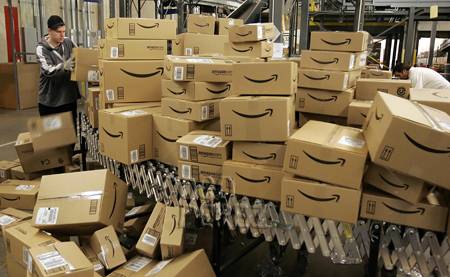
Ordering gifts online is getting more popular every year; it is certainly convenient, however, except for the disappointment of recieving the actual present after the special day. After years of dealing with refunds and customer complaints, Amazon is finally taking a new approach to improve on what is described as the “cardinal sin of online retailing” by Stone in his Business Week article.
Previously, Amazon has been heavily reliant on the UPS, its largest partner, to handle a large portion of its packages. This eventually became a serious a problem as demand expands. Recently, Amazon turned to Postal Service to expand on its key partners list. At the same time, U.S. Postal Service is also adjusting their service rates to better compete with its major competitors, UPS and FedEx. In addition to lower prices, USPS also have the competitive advantages in parking as well as providing more services on holidays/week ends. On the other hand, building more fullfillment/sortation centers across North America will also allow Amazon to have more flexiblity in shipment options. In other countries such as China, Amazon is already offering direct shipping with its own channel that typically deliver goods in less than a week.
These two changes made can potentially solve the biggest problem that the company faces: late shipments is not only costing the company money, but also its brand image and buyers’ trust. Fortunately, Amazon’s management was able to identify the source of issue and make correct operational decisions (discussed in Class 6) to fix the problem. It is vital for online sellers like Amazon to strengthen its customer relationship, and that brand promise can only be established by more efficient services, thus they can use their value proposition to their best advantage.
Article Links:
Amazon’s Grand Plan to Avoid Holiday Delivery Snafus Again
Amazon Casts Its Vote With the Postal Service
The Postal Service’s Biggest Advantage Over FedEx: Free Parking
Citations:
Leonard, Devin. “Amazon Casts Its Vote With the Postal Service.” Bloomberg Business Week. Bloomberg, 11 Sept. 2014. Web. 28 Sept. 2014.
Stock, Kyle. “The Postal Service’s Biggest Advantage Over FedEx: Free Parking.” Bloomberg Business Week. Bloomberg, 05 Sept. 2014. Web. 28 Sept. 2014.
Stone, Brad. “Amazon’s Grand Plan to Avoid Holiday Delivery Snafus Again.” Bloomberg Business Week. Bloomberg, 26 Sept. 2014. Web. 28 Sept. 2014.
Image: http://goodereader.com/blog/uploads/images/amazon-may-start-charging-sales-tax__oPt.jpg
